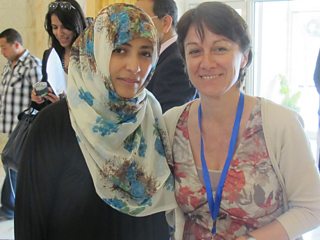Whose voice counts and how do we count them?
Kirsty Cockburn
Director of Communications and Fundraising, Βι¶ΉΤΌΕΔ Media Action
Tagged with:

Nobel Peace prize laureate Tawakkol Karman (left) and Kirsty Cockburn (right)
Μύ
World Press Freedom Day: A snapshot of .
Riding a wave of Tunisian pride, Tawakkol Karman, the Yemeni Nobel Peace Prize Laureate, instantly captured our attention when she began her keynote speech in song. In my headphones the translator stopped in his tracks, and then, recovering, explained:
"She is singing the Tunisian national anthem. She is saying 'Bondage can be broken. Destiny must respond. Darkness can only go away'." In a voice cracking with emotion he added: "She is singing over and over, 'Bondage can be broken'."
Around us Tunisians were getting to their feet and joining in. Karman explained that, during her flight to Tunis she had kept repeating this song. It was, she said, the anthem of the Arab Spring. The people had spoken and had worked together to make the change.
At 33, journalist and activist Tawakkol Karman is the youngest ever Nobel Peace Laureate, awarded jointly in 2011 to Karman, Ellen Johnson Sirleaf and Leymah Gbowee. Her work has promoted the safety of women and of women's rights to full participation in peace-building in Yemen. Hers was one of many stories of journalists speaking truth to power.
Yet the past year has been an especially deadly one for journalists around the world – 62 have died as a result of their work. Posters and petitions in support of several young imprisoned Syrian bloggers were visibly on show around the conference. And the proliferation and significance of new media – a growing 'netizenship' – has of course been a central theme.
Vivienne Walt of Time magazine, was optimistic about the power of social media, but cautious:
"The last time I flew into Tunis, it was under a cloud of tear gas, and the shutters were coming down at the airport. I was able to alert my editors to the fact that something big was going on. With social media we have a direct line to the people, we can get a sense of who is doing what and what people think. But don't overstate social media – we do have a tendency to be self-congratulatory. Internet penetration is low and self-selective."
Irina Bakova, UNESCO Director-General spoke of: "Humanity moving into a time of social media and the internet… but one in five people on the planet is illiterate. How can we generate plurality of access to information? It can only happen when countries have adequate legislation."
Other challenges were highlighted elsewhere. At Βι¶ΉΤΌΕΔ Media Action's panel event, panel member Diana Senghor, Director-General of Panos Institute, West Africa, concentrated on inequality of access and the ongoing challenge of ensuring space for the voices of the most disenfranchised.
"The media can answer the need for information, but we also need specific societal change. How do we educate – who needs the information? How do we define the need? We often ignore major differences between income, education, urban and rural, and access to information itself. And so we discriminate. Whose voices should be heard? How do you support the voices of the most marginalised?"
Training, research, and specific funding to support the most disadvantaged all help, but it's also about challenging and exploring social norms, and sharing new and alternative ways of thinking. Irina Bokova, spoke of: "New voices rising – especially young people – where they were silent before. New-found media freedom is promising to transform societies through greater transparency and accountability."
I was reminded of a recent remark about new media by Arianna Huffington of the web-based Huffington Post. Addressing the she said:
"Media helps scale up community messages and creates a sense of urgency. The key is repetition, cross-post as much as you like. It is by volume that you break through. It is not just doing one thing, it is doing it every day to explore and expose stories that are not being covered."
Back at the World Press Freedom day conference, this sentiment was echoed by Dr Moncef Marzouki, the interim President of Tunisia, who reflected on the extraordinary ripple effect of Tunisia's revolution in January 2011. And others recalled TV images from Tahrir Square, Egypt, of Egyptians holding the Tunisian flag and signs saying: 'Thank you Tunisia'.
So it was with unfortunate timing that - on World Press Freedom Day itself - for 'undermining morality and public order' by screening the film Persepolis, an award-winning Franco-Iranian film, which briefly showed a depiction of God. US Secretary of State Hillary Clinton expressed concern in her video address to the conference, while the Tunisian president (a former rights activist himself) said the verdict was bad for the country. The screening had provoked protests by thousands, and resulted in a government statement at the time calling for 'respect for sacred things'. It underlines the ongoing tensions between Islamists and secularists and the challenges of transition.
For Tunisia, in a change from those early tumultuous days, it's now a more gradual process of transition ahead of elections later this year. The country has already jumped 30 places up the ranks of the freedom of expression index, and there is commitment to get democratic processes enshrined in law.
The revolution happened so quickly, and access to information played such a central part, there is huge appetite for media reform, editorial support and journalism training. Βι¶ΉΤΌΕΔ Media Action's work in the country, in partnership with others, is to provide training and capacity support to Tunisian TV and radio as it moves from state-ownership towards public service broadcasting.
Education, access, openness and equity matter. Sometimes, the results are extraordinary, and a solitary voice can resonate and scale up, as Karman illustrated so eloquently and simply, when she sang a joyful anthem for us all.
